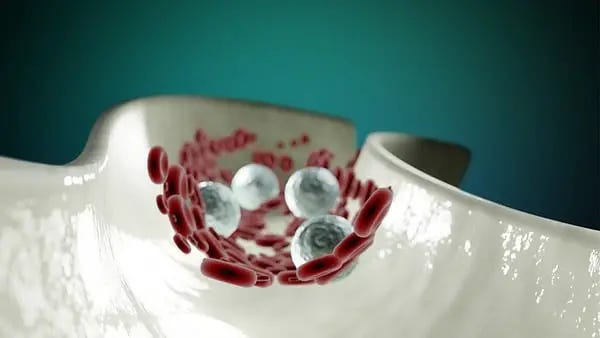Are you looking for an all-natural supplement to help improve your overall health? If so, berberine may be the answer. Berberine is a compound found in several plants that has been used for centuries in traditional Chinese medicine and Ayurveda. It has recently gained popularity due to its potential benefits on cardiovascular health, diabetes management, weight loss, and more.
Table of Contents
Health Benefits of Berberine
Berberine can provide a wealth of health benefits, such as improved blood sugar control, cholesterol-lowering effects, depression relief, anti-inflammatory and antioxidant properties, better heart health, digestive wellness promotion and even aid in weight management.
Blood sugar control
Berberine is a natural and incredibly powerful compound found in plants such as barberry, goldenseal, Oregon grape root, and tree turmeric. It has the potential to effectively control blood sugar levels in individuals with type 2 diabetes and pre-diabetes by regulating insulin production as well as other hormones related to glucose metabolism.
It can also reduce overall glucose concentrations in both diabetics and non-diabetics because of its effect on suppressing enzymes that cause your body to convert protein and fat into glucose.
Besides positively impacting glucose response, berberine has been shown to improve the production of adiponectin — an essential hormone used for regulating fat — helping stimulate blood sugar lowering and uptake into skeletal muscles while fighting obesity.

Blood pressure regulation
Berberine is an active compound found in many medicinal plants. It has been found to offer various health benefits, including helping reduce blood pressure levels. Studies suggest berberine can help lower both systolic and diastolic blood pressure by having direct vasodilatory effects on the cardiovascular system, as well as by increasing nitric oxide production and inhibiting the enzyme angiotensin-converting enzyme (ACE).
Not only this, but berberine also appears to be effective when used alongside pharmacologic drugs for hypertension management. In addition, some research suggests that berberine may play therapeutic roles in arrhythmia and heart failure when taken with other agents.
If you suffer from higher than normal blood pressure levels, then it’s worthwhile considering adding a supplement of Berberine into your daily routine — especially where prescription medicines don’t seem effective or have intolerable side effects.
Cholesterol reduction
Berberine is a naturally occurring chemical from plants that has been proven to reduce cholesterol levels in the body. Numerous studies have confirmed its positive effects on heart health, as berberine can decrease LDL (bad) cholesterol and increase HDL (good) cholesterol levels.
In addition, it has been found to lower total and triglyceride levels in individuals with high cholesterol.
Berberine works by blocking several enzymes involved in lipid synthesis, keeping them from converting glucose into fat molecules and lipoproteins like LDL. This effectively reduces blood concentrations of those fats that could lead to unhealthy cardiovascular conditions over time.
It also increases bile acid production, which helps break down dietary fatty acids more efficiently, while reducing chylomicron formation — a type of particle that is made after consuming fat-rich foods is linked to a higher risk for coronary artery atherosclerosis if present at too great a level.
Depression relief

Berberine has demonstrated potential for relieving symptoms of depression and anxiety. Animal studies have suggested that berberine could be used as a natural remedy for these mental health conditions.
Additionally, its anti-inflammatory and antioxidant properties may help reduce inflammation-induced depression. Berberine’s role in heart health, sleep, gut health, and antibody production makes it an ideal supplement to combat depressive symptoms.
Studies have also found that berberine can lower insulin levels, which is important in managing stress levels often associated with depression or anxiety. Moreover, it can act on ‘bad’ cholesterol resulting in improved neurological functioning which will further benefit mental illnesses like depression and anxiety.
Anti-inflammatory and antioxidant effects
Berberine has been found to have beneficial anti-inflammatory and antioxidant activities, which are important for its efficacy in managing diabetes mellitus. It helps reduce inflammation that causes symptoms like pain and swelling while also protecting cells from oxidative stress and damage caused by free radicals.
This can support improved blood glucose control by helping regulate insulin levels in people with type 2 diabetes. Recent studies show that berberine may help promote weight loss through multiple pathways, such as reducing fat accumulation, decreasing appetite, modulating hormones related to hunger control, and reducing energy absorption from food.
In addition, it may help improve cardiovascular health by lowering protein levels closely associated with heart disease. Regular intake of this compound can help reduce inflammation linked to various conditions affecting the heart’s functioning, such as stroke or high cholesterol levels.
Heart health improvement

Berberine has been found to positively affect heart health, helping reduce the risk of cardiovascular disease and improve overall function. Studies indicate that berberine can lower levels of what is referred to as “bad” cholesterol in the body, as well as reduce inflammation in endothelial cells that line blood vessels.
In addition, by increasing insulin sensitivity, it can help regulate irregular heartbeats. Berberine has also been shown to increase nutrient absorption in those with artery hardening and abdominal fat, thus promoting healthier arteries and reducing the risk of stroke or heart attack.
Its anti-inflammatory properties make it an ideal supplement option for naturally improving your cardiovascular system’s functioning without medications. Taking berberine regularly may help prevent further damage from occurring when issues related to heart health arise, such as high blood pressure or clogged arteries, due to its sealing ability against lipid plaques building up inside vessel walls while safeguarding its flexibility at the same time.
Digestive wellness promotion
Berberine is a naturally-occurring compound found in several herb plants used historically for its digestive health benefits. Studies suggest it may help promote gut health and digestion and reduce gastrointestinal issues such as dyspepsia and diarrhea.
Berberine contains anti-inflammatory properties that can soothe inflammation in the gut lining and improve beneficial bacteria levels to support optimal digestion and nutrient absorption.
Additionally, research indicates that berberine can potentially inhibit the growth of harmful bacteria like E. Coli, helping to prevent infection or an upset stomach due to food poisoning.
Finally, studies have shown that berberine could help protect against leaky gut syndrome by strengthening tight junctions between cells in the intestinal wall — decreasing their permeability and preventing toxins from passing through into the bloodstream.
Berberine could regulate the structure and function of the human gut microbiota, and Bifidobacterium has the potential to enhance the hypoglycemic effect of berberine. These findings provide new insights into the hypoglycemic potential of berberine and Bifidobacterium.
Research by Ming, J., Yu, X., Xu, X. et al. 2021
Sleep improvement
Berberine, a natural supplement, is linked to numerous health benefits like sleep improvement. It influences hormones that regulate steroid production and help sort out issues related to impaired circadian rhythms or erratic sleeping patterns.
Studies have demonstrated berberine’s potential as an effective natural aid for conditions such as insomnia and other sleep problems associated with menopause and stress. Berberine has been found to increase melatonin levels in the body, which helps improve overall quality and duration of sleep.
Alongside improving cognitive performance, these effects can also positively influence mood and reduce feelings of depression since better rest equates to more energy during waking hours.
Furthermore, taking advantage of its anti-inflammatory activity could also lead to additional restful moments since chronic inflammation often prevents human beings from getting deep slumber cycles while impairing hormonal regulation systems related directly to nighttime rest and recovery.
Weight Management Support

Berberine is known to be a powerful supplement in promoting weight loss and maintaining overall health. It works by stimulating insulin receptors, improving blood glucose levels, and reducing insulin resistance — all of which contribute to successful weight management.
The primary mechanism through which berberine may help manage weight is by regulating the hormones involved in fat metabolism. Additionally, berberine aids digestion and can improve muscle strength as well as body composition.
For those looking for ways to safely lose or maintain weight while keeping their heart healthy, taking regular doses of berberine supplements may be helpful. In addition to controlling blood sugar levels, it has been found that berberine can lower total cholesterol, “bad” LDL cholesterol (low-density lipoprotein), and triglycerides — increasing cardiovascular safety while supporting better long-term health outcomes without relying on medications or dietary strategies alone.
This should not be confused with conventional weight loss drugs. Additionally, while berberine may provide some support for fat loss, there is no miracle quick-fix hack for healthy weight management.
Canker sore treatment
Berberine may be an effective remedy for canker sore treatment. Studies have found that its direct application to the sores themselves can reduce pain, redness, and size of the ulcers. Berberine also has anti-inflammatory and antioxidant properties which make it a useful natural remedy for soothing inflammation in the mouth.
It is thought that berberine could be helpful in treating irritation due to discomfort from canker sores. One study even found that berberine could ease the symptoms associated with aphthous stomatitis — commonly known as canker sores.
Taking berberine orally or using it as a topical ointment are both options when considering this natural treatment option for mouth ulcers.
Reduced cancer risk

Berberine, a natural supplement derived from plants like the Berberis vulgaris shrub, has been shown to offer numerous health benefits. Some of these include its potential ability to reduce cancer risk.
Several animal and human studies have suggested that berberine can act as an anti-inflammatory and antioxidant which can help protect against cell damage that could result in cancer cells forming.
Additionally, it is thought to be able to prevent tumor growth by reducing oxidative stress and increasing apoptosis (programmed cell death). It also appears to stop the growth of existing tumors or restrict their spread by inhibiting angiogenesis (the formation of new blood vessels).
How to Take Berberine
Berberine is available in many health food and supplement stores. It also comes in capsule, tablet, powder, tincture, or extract forms for easy consumption.
Recommended dosages range from 200 mg to 1500mg per day. In the case of higher doses, it is often evenly divided into three doses that are each taken with a meal.
Potential Side Effects of Berberine
Berberine has the potential to produce side effects in some individuals, such as;
- Diarrhea
- Constipation
- Gas
- Upset stomach
Because Berberine has effects on the body similar to medication, it could alter how medication affects you. The effects of medication may increase or remain in your system for longer than intended.
Taking berberine along with diabetes medications may cause blood sugar levels to drop too low. It is recommended to monitor your blood sugar levels regularly if the two medications are taken together. Those with allergies to plants in the Berberis family, including golden seal, barberry, or Oregon grape should not take berberine without first consulting a health care professional.
Conclusion
Berberine is a remarkable natural compound that has powerful health benefits. It has been shown to help regulate blood sugar levels, reduce bad cholesterol levels, and improve heart health. Berberine can also support weight loss goals and potentially lower the risk of cancer. It even helps improve sleep quality and digestion and supports anti-aging effects.
The medicinal properties of berberine make it an incredibly beneficial supplement for overall wellness and support in managing many chronic illnesses like diabetes and cardiovascular disease. With its amazing potential as a natural remedy for various ailments, berberine should definitely be something you consider adding to your daily routine!
It is important to consult your healthcare professional before beginning any course of action or supplementing your diet with any product containing berberine from medicinal herbs like Jinhua Snakegourd Root (Tusizi) or Coptis Chinensis (Huanglian). This is particularly true if pregnant or on any form of medication.
FAQs
1. What is berberine?
Berberine is a plant extract from the Berberis family of plants, which includes barberry, Oregon grape, and goldenseal. It has been used for centuries in traditional Chinese medicine as a natural remedy for digestive issues, infections, and inflammatory disorders.
2. How can I use Berberine?
Berberine is available in both capsule and powder form and can be taken orally or applied topically to the skin. Some people prefer to take it in food or drink forms such as tea or smoothie bowls while others mix it into recipes like marinades or dressings.
3. What are some of the potential health benefits of taking berberine?
Studies have shown that berberine could help improve heart health by lowering triglyceride levels, promote weight loss because of its ability to reduce caloric intake levels from fat consumption; defend against certain diseases such as diabetes or cancer; benefit hormone balance; support liver function; maintain oral health because of its anti-inflammatory properties; lower blood pressure; aid digestion through helping with constipation relief & more!
Research Lan, J., Zhao, Y., Dong, F., Yan, Z., Zheng, W., Fan, J. and Sun, G., 2015. Meta-analysis of the effect and safety of berberine in the treatment of type 2 diabetes mellitus, hyperlipemia and hypertension. Journal of ethnopharmacology, 161, pp.69-81 https://doi.org/10.1016/j.jep.2014.09.049 Xia, L.M. and Luo, M.H., 2015. Study progress of berberine for treating cardiovascular disease. Chronic Diseases and Translational Medicine, 1(04), pp.231-235. https://mednexus.org/doi/pdf/10.1016/j.cdtm.2015.11.006 Ming, J. et al. (2021). Effectiveness and safety of Bifidobacterium and berberine in human hyperglycemia and their regulatory effect on the gut microbiota: a multi-center, double-blind, randomized, parallel-controlled study. Genome Medicine, 13 (1), Springer Science and Business Media LLC. [Online]. Available at: https://doi.org/10.1186/s13073-021-00942-7 Ko, W.H., Yao, X.Q., Lau, C.W., Law, W.I., Chen, Z.Y., Kwok, W., Ho, K. and Huang, Y., 2000. Vasorelaxant and antiproliferative effects of berberine. European journal of pharmacology, 399(2-3), pp.187-196. https://doi.org/10.1016/j.fct.2010.01.033 Sheila A Doggrell (2005) Berberine – a novel approach to cholesterol lowering, Expert Opinion on Investigational Drugs, 14:5, 683-685, https://doi.org/10.1517/13543784.14.5.683 Imenshahidi, M. and Hosseinzadeh, H., 2019. Berberine and barberry (Berberis vulgaris): a clinical review. Phytotherapy Research, 33(3), pp.504-523. https://onlinelibrary.wiley.com/doi/abs/10.1002/ptr.6252 Pierpaoli, E., Cirioni, O., Simonetti, O., Orlando, F., Giacometti, A., Lombardi, P. and Provinciali, M., 2020. Potential application of berberine in the treatment of Escherichia coli sepsis. Natural Product Research. https://doi.org/10.1080/14786419.2020.1721729 Shinjyo, N., Parkinson, J., Bell, J., Katsuno, T. and Bligh, A., 2020. Berberine for prevention of dementia associated with diabetes and its comorbidities: A systematic review. Journal of integrative medicine, 18(2), pp.125-151. https://doi.org/10.1016/j.joim.2020.01.004 Fan, J., Zhang, K., Jin, Y., Li, B., Gao, S., Zhu, J. and Cui, R., 2019. Pharmacological effects of berberine on mood disorders. Journal of cellular and molecular medicine, 23(1), pp.21-28. https://onlinelibrary.wiley.com/doi/pdfdirect/10.1111/jcmm.13930 Behl, T., Singh, S., Sharma, N., Zahoor, I., Albarrati, A., Albratty, M., Meraya, A.M., Najmi, A. and Bungau, S., 2022. Expatiating the pharmacological and nanotechnological aspects of the alkaloidal drug berberine: current and future trends. Molecules, 27(12), p.3705. https://www.mdpi.com/1420-3049/27/12/3705/pdf Kwon, S. and Chan, A.T., 2020. Extracting the benefits of berberine for colorectal cancer. The Lancet Gastroenterology & Hepatology, 5(3), pp.231-233. https://doi.org/10.1016/s2468-1253(19)30430-3 Wang, Y. and Zidichouski, J.A., 2018. Update on the benefits and mechanisms of action of the bioactive vegetal alkaloid berberine on lipid metabolism and homeostasis. Cholesterol, 2018. https://downloads.hindawi.com/archive/2018/7173920.pdf Caliceti, C., Rizzo, P. and Cicero, A.F.G., 2015. Potential benefits of berberine in the management of perimenopausal syndrome. Oxidative Medicine and Cellular Longevity, 2015. https://www.hindawi.com/journals/omcl/2015/723093/



















